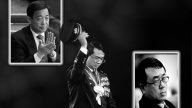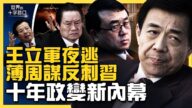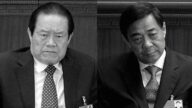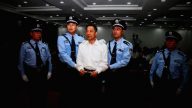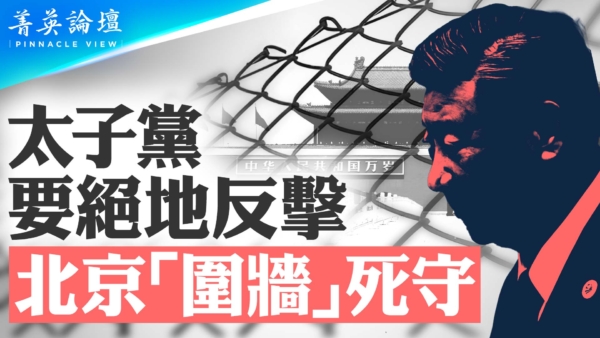【新唐人2013年08月17日讯】自从去年年底以来,大陆四川接连爆出多宗大案。最近,四川成都官场再发“大地震”,大批官员被清洗。其中,最引人注目的,当属前重庆市公安局局长王立军案的审判长被免职的消息。而且,据香港媒体报导,全球关注的前重庆市委书记薄熙来案将在8月23号开审,距离仅仅十天,当局在这个时机公布王立军案的审判长被免职的消息,其中到底有什么隐情和内幕?让我们一起来了解。
薄熙来案开审在即,四川官场出现罕见的人事变动。
8月13号,中共成都市委组织部官网在一天内,密集发出44宗人事任免通知,共涉及51名中共官员的任免。其中,王立军案主审法官钟尔璞被免的消息,迅速引发海内外媒体的关注。
8月14号,钟尔璞回复大陆媒体问询时,宣称自己是因为年龄到点,正常退休。这个说法遭到外界普遍质疑。大陆网友在微博上曝出,钟尔璞出生于1965年,今年才48岁。
湖北武汉《中国》杂志社记者刘逸明:“现在退休是绝对不正常的,不可能是48岁退休的。最大的可能性是他在工作当中,被上级认为是政治不正确。”
诡异的是,目前中国网路上,钟尔璞的出生年龄出现不同说法,如百度百科上就同时出现了1965年和1953年两个版本。此外,有媒体称他出生于1959年。大陆《21世纪经济报导》记者李微敖在微博上则说,成都中院人士指称钟尔璞已经超过60岁了。
中共党政机关、群众团体、企业、事业单位的男性官员,按照大陆的法定退休年龄,需要符合以下条件:一是、年满六十周岁,参加工作年限满十年的﹔二是、年满五十周岁参加工作年限满十年,经过医院证明完全丧失工作能力的﹔三是、因工致残经过医院证明,完全丧失工作能力的。
就在钟尔璞被免职消息,以及对他的年龄猜测满天飞的同时,香港《文汇报》报导,薄熙来案可能于8月23号在济南中院开审。
《微视频 》主持人赵培表示,现在外界都认为钟尔璞被免职事件有不寻常之处,但目前需要弄清楚的两大问题是,到底中共高层对这个审判长有什么不满?中共党内又想通过免职这个法官,来对薄熙来案造成什么影响?
2012年2月爆发的王立军事件,引发海内外的强烈关注。同年9月24号,四川省成都市中级法院作出一审宣判,对王立军数罪并罚,其中,徇私枉法罪和受贿罪判的最重一个7年、一个9年。而叛逃罪和滥用职权罪,则分别判处2年。
《微视频 》主持人赵培:“叛逃罪和滥用职权罪,这2个涉及到国家机密,秘密审判的罪反而判的最轻,都是2年。这就是说,当时王立军的叛逃和滥用职权,都是有情可原的。这些必须要带入薄熙来案的审判,薄熙来案里也有一个滥用职权罪。估计这个滥用职权就会秘密审判。当时传闻王立军秘密审判中,他在薄熙来的命令之下,窃听中共高层的行为是滥用职权。”
赵培分析,如果中共高层对王立军案的审判长有所不满,很可能是叛逃罪和滥用职权罪判轻了,而两个很普通的罪却被判重了。
赵培:“如果这一个是真的话,薄熙来案中滥用职权罪将会重判,两个经济罪不会是主要刑期的考量。另外一点,这个时候对法官免职,也可能有人想增加薄熙来审判的压力,让法官对薄熙来从重判刑的压力,这也是可能的。”
《法国国际广播电台》报导说,当时所有的外国媒体都被禁止旁听王立军案。但王立军在庭审中的陈述,作为庭审庭长的钟尔璞应当听到了,但他听到什么或将成为机密。
台湾《中央社》报导则直接指称,中共当局刻意避免重大案情泄漏,而有意采取“雪藏”措施,俨然已成为惯例。
采访/陈汉 编辑/王子琦 后制/孙宁
Presiding Judge over Wang Lijun’s Case Dismissed
Since the end of last year, many major cases came out
of Sichuan Province.
Recently, earth-shaking events happened to
a large number of officials from Sichuan.
Among them, the most notable was undoubtedly the dismissal
of the judge who presided over the Wang Lijun case.
According to Hong Kong media reports, the world’s attention
will be on the trial of Bo Xilai on August 23.
What is the inside story of the Chinese Communist Party’s
(CCP) dismissal of this judge at this time?
With the approaching trial of Bo Xilai, unusual personnel
changes appeared among Sichuan officials.
On August 13, the Chengdu Municipal Organization
Department official website issued 44 notifications for appointments and dismissals.
A total of 51 officials were dismissed, including Zhong Er Pu,
the trial judge of the Wang Lijun case.
This news quickly attracted media attention
at home and abroad.
On August 14, when questioned by the Mainland media,
Zhong Er Pu replied that he was old enough to retire.
Outsiders doubted his explanation of age.
Netizens said online that Zhong was born in 1965
and was 48 this year.
Reporter Liu Yiming, China magazine, Wuhan:
“It is abnormal to retire at 48.
Most likely, his superiors consider him to have been
politically incorrect.”
Strangely enough, currently, there are two different versions
of Zhong’s age circulating on the Internet.
Both the years 1965 and 1953 were simultaneously listed
on Baidu Encyclopedia.
Some media said that Zhong was born in 1959.
21st Century Business Herald reporter Li Wei Ao said
on his blog that people from Chengdu Intermediate Court alleged Zhong is over 60.
According to Mainland retirement rules, in order to retire,
male officials of the CCP and government organizations,
mass organizations, enterprises and institutions need to be
at least 60 years of age with at least a 10-year work history,
over fifty years of age with at least a 10-year work history
plus official proof of total loss of ability to work from
a hospital, or show proof of a disability that resulted from
work (after the hospital proves the inability to work.)
News regarding the dismissal of Zhong Er Pu and the trial
of Bo being held on August 23 appeared at the same time.
Micro Video host Zhao Pei said that observers believed
there was something peculiar with Zhong’s dismissal.
However, two questions need answers.
Why is the CCP unhappy with Zhong?
And what kind of impact will his dismissal have
on Bo’s trial?
The Wang Lijun incident in February 2012 caused
strong concern at home and abroad.
On September 24, Chengdu Intermediate People’s Court
sentenced Wang Lijin to seven years for favoritism,
nine years for bribery, and two years for defection
and abuse of power.
Micro Video host Zhao Pei: “Defection and abuse of power
both touch on state secrets and a secret trial.
They received a sentence of only two years combined.
That means Wang’s two crimes could be extenuated and
the outcome of Wang’s case will be brought into Bo’s trial.
It is believed that abuse of power also applies to Bo
and will result in a secret trial.
It was learned during Wang’s secret trial that his
eavesdropping on high ranking officials under Bo’s order was considered an abuse of power.”
Zhao Pei analyses that if senior officials are dissatisfied with
Zhong Er Pu, it is probably due to his sentencing of Wang,
as he was too light on the crimes of defection and abuse
of power and too heavy on two other ordinary crimes.
Zhao Pei: “If this is true, Bo Xilai’s abuse of power would
be sentenced severely, and two economic crimes will not.
Another point is that it’s also possible that someone wants
to put more pressure on the presiding judge to sentence Bo heavily.”
Radio France Internationale reported that foreign media
outlets were banned from attending Wang Lijun’s case,
so they could not hear his statements in court.
However, Judge Zhong Er Pu heard everything and
what he heard will become confidential forever.
Taiwan’s Central News Agency reports directly alleged
that it is a norm for the CCP to take a “freezing” measure to avoid major case leak.


